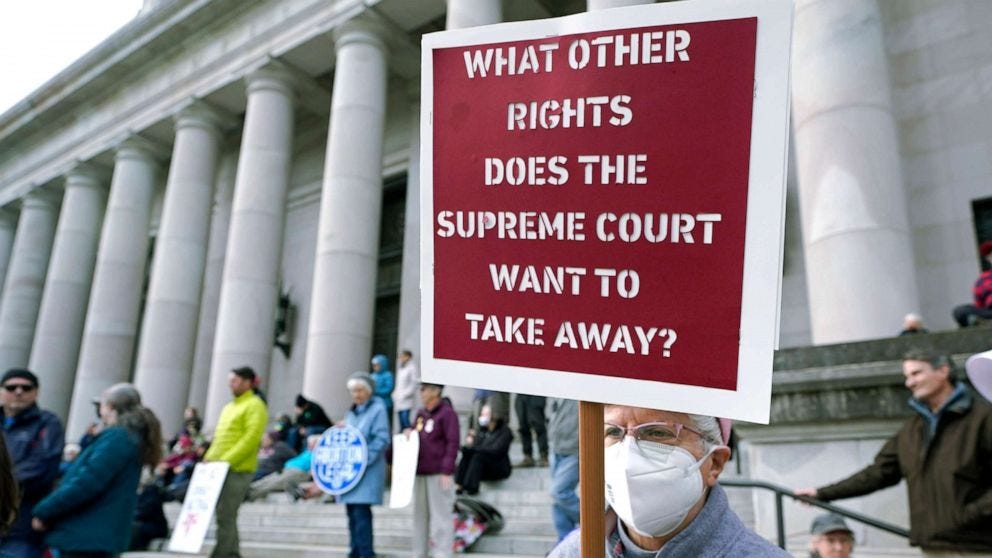This dreadful ruling hasn't concluded the state of abortion in the United States - women must have the right to choose for themselves
The news that the Roe v Wade ruling will be overturned sends a dark cloud across America and the world - but don't let anyone tell you this is over. The power rests with the people.

My phone pinged, my eyes veered, my mouth wide open. I am not a woman, but the fight for pro-abortion rights is not only exclusive to women, just like the fight for LGBTQ+ rights isn’t only fought by LGBTQ+ people; others can fight for and support the cause. The ruling on Friday that the US Supreme Court concluded upon - that Roe v Wade will be overturned - leaves the ability of women to choose what’s best under total challenge.
The Roe v Wade case was first brought to the Supreme Court in 1973 when Jane Roe, her pseudonym name, became pregnant with her third child and wanted an abortion. As she lived in Texas, however, abortion was not permitted. She filed a lawsuit against Henry Wade, her local district attorney, because - according to Roe - there was unconstitutionality within Texas’s abortion laws. The case was thus brought to the Supreme Court’s attention and they voted, by 7-2, to protect a woman’s right to have an abortion. The case was settled, at least we thought.
What Friday’s decision means for millions of American women could never be more overstated - it will strip them of the basic right to choose what’s best for them. Allowing individual states to make the decision on legalising abortion or not simply increases the political and societal divide across the United States. Certain states choosing one side, others choosing the opposite. If Karen, let’s say, lives in California and wants an abortion, she may have the right to do that. However, her friend, Stacy, let’s say, lives in Utah, yet she may be fundamentally denied the right to have an abortion - all because of her geographical location? Would Karen in California feel entirely comfortable or content that she has that right while Stacy in Utah is being denied?
What now follows is deeply uncomfortable, as indicated: some states have been lining up, since Friday’s ruling, ready to enforce their anti-abortion stance on their citizens.
Alabama: as it has a Republican-controlled legislature and governor, the state wishes to ban abortion in all its forms. In 2019, Alabama sought to implement one of the strictest abortion regulations throughout the whole US, making it felony for anyone who performs an abortion with no exceptions for rape or incest. However, it was blocked by a federal judge but, with the Supreme Court ruling, Alabama has now implemented a full wide-scale ban on abortion.
Arkansas: the state’s Republican governor, Leslie Rutledge, confirmed its ban on abortion on Friday.
Utah: confirmed by local news agencies, Utah now has a ban on abortion in place.
Missouri: the state was the first to implement a full abortion ban after the Supreme Court’s verdict, its attorney general, Eric Schmitt, said.
North Dakota: the sole abortion clinic in Fargo, the state’s largest city, announced its closure due to the ban.
Here are only some - others include Oklahoma, Louisiana, Kentucky and South Dakota.
What now follows is extremely important and crucial in this whole abortion debate: in November, American voters head to the polls, electing 35 of the 100 members of the Congress’s upper house, the Senate, and electing all 438 members of the House of Representatives, its lower house. Those elections will now be fought against a backdrop of division on abortion and the differing views of American voters as they head to the polls in a few months.
On contrary to this debate, we have seen several states show their support for a woman’s right to do what is best for them. California, Washington and Oregon’s Democratic state governors all launched a collective welcoming haven for women seeking abortions, labelling their states as “a safe haven for all people seeking abortions and other reproductive health care services”. Illinois, New Mexico, Colorado, New York, New Jersey and Vermont have all reiterated their support for a woman’s right to have an abortion (and so have several other states too).
Another component of subsequent events after this week’s ruling is potent to recognise: as ‘Justice’ Clarence Thomas, a right-wing conservative judge on the nine-member Supreme Court, appeared to suggest, the Supreme Court now looks set to overhaul major rulings on the permittance of same-sex marriage in the United States along with contraception. Like so many other countries across our globe, the United States of America has societally progressed, embracing inclusion and diversity and difference for its people. Let’s be clear, however: like this ruling, these possible future Supreme Court ones will be a backwards step for America, a country that symbolises hope, freedom, opportunity, aspiration, tolerance and so many other fundamentally positive values.
I wouldn’t dare tell any woman to have an abortion nor would I fundamentally strip the right away completely for women to do so. That is precisely the point: those of us who support abortion rights, whether men or women, aren’t demanding of every woman that they must have an abortion; it’s about giving each woman that choice - the choice that will best fit their circumstances and needs.
The Supreme Court’s ruling won’t help America progress as a society - it reverses the whole debate and takes us back to pre-1973. As women and future mothers digest the news, imagine the fear that will traipse around their minds - that a right they once had to choose the best option for them has been grabbed by just five individuals.


